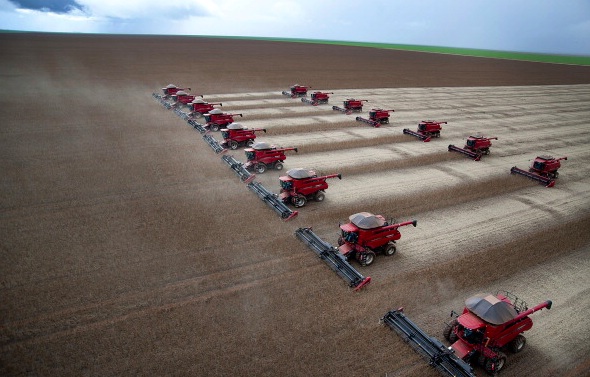By Rose Niu

In a speech given December 3 at the China Pavilion of COP21 in Paris, Chairman Ning Gaoning of COFCO (China National Cereals, Oils and Foods Corporation) underscored the company’s intention to improve its global supply chains to fight climate change. To outsiders looking for more concrete commitments, the speech may not seem like a big deal. But in China, where reading the tea leaves is an art, such public pronouncements are rarely empty, and in this case they signify a fundamental shift in China’s rhetoric—and action—related to climate change and environmental protection.
COFCO, a huge, state-owned enterprise, is China’s flagship agribusiness corporation and one of the top importers of soy and palm oil, and its chairman is the equivalent of a minister in ranking. And so the mere fact that Ning even made the journey to Paris, where the world’s leaders are gathered to try to negotiate a global climate agreement, signifies the importance his company—and the central government (after all, COFCO is a huge state-owned enterprise)—places on environmental responsibility these days.

“COFCO is like a knot linking producers and exporters from many countries with Chinese consumers,” Ning said in his speech. He went on to say that COFCO will “endorse and support” farmers around the world in producing crops in environmentally friendly ways. “We will not buy products grown from areas of deforestation or conversion of natural habitats, or the crops produced by using a lot of pesticides, water and other chemicals due to poor management of farming practices,” Ning added. “We will strive to establish green and sustainable global supply chains, because we are in a great position to decide what product we buy or do not buy to meet the increasing demand of Chinese consumers for environmentally friendly agriculture products.” It is commendable that COFCO is committed to such sustainable business practices. More importantly, COFCO exemplifies the way in which China’s companies can play a significant positive role in combatting global climate change.
As the world’s largest importer of soy and second largest importer of palm oil, which are major drivers of deforestation and conversion of natural grasslands in tropical countries in South American and SE Asian countries respectively, China has the opportunity to make a significant contribution to the global effort to stop deforestation and conversion of natural habitats in these countries.
Commercial agriculture and deforestation together account for 24% of global greenhouse emissions, and so the biggest near-term opportunity to slow climate change is to reduce tropical deforestation, forest degradation and conversion of natural grasslands. Both the Brazilian and Indonesian governments have been making progress in controlling the deforestation and conversion of natural grasslands from rapid expansion of soy and oil palm plantation and cattle raising, but they still face many challenges in stopping deforestation and conversion of grasslands. A clear market demand signal for sustainability from a major market like China will help drive the behavior change of the producers and exporters towards sustainable production.
Working toward helping China send such a message to its suppliers, the Paulson Institute partnered with Solidaridad, The Nature Conservancy and the World Wildlife Fund in March to launch the Sustainable Soy Trade Platform, which aims to help key players in the soy industry work together to advance responsible procurement of soy from South American countries to the China market.
Specifically, the initiative aims to send a strong market demand signal to Brazilian producers and exporters and to help the Brazilian government to accelerate producers’ compliance with its Forest Code, which will ultimately contribute to combatting climate change. The initiative will eventually be expanded to other countries in Latin America. By convening and connecting key soy producers, traders and buyers through this initiative, we will share best practices on supply chain management and enable Chinese market stakeholders to develop consensus and align strategies to jointly send a demand signal for sustainability.
COFCO’s public commitment to working with international partners to fight climate change and work on improving supply chain management is an important first step. COFCO now has the opportunity to become a real game changer, by implementing the commitments Chairman Ning made in Paris and establishing concrete policies and procedures for achieving green, clean and low carbon supply chains for the most environmentally challenging commodities, such as soy, palm oil and beef. It would send a powerful signal to the world that China is serious about achieving its carbon reduction goals. And it will message other companies all across China that they should follow suit.
Other multinational agribusiness companies, such as Bunge, Cargill and Wilmar International have made time-bound commitments to zero deforestation in their supply chains. COFCO’s effort shows that Chinese companies also have the vision and ability to become true global leaders. We believe that Chinese and international businesses must be an important part of the solution for climate change, and for ensuring the long-term health of the planet and prosperity of humanity.
Rose Niu is the Paulson Institute’s Chief Conservation Officer.


